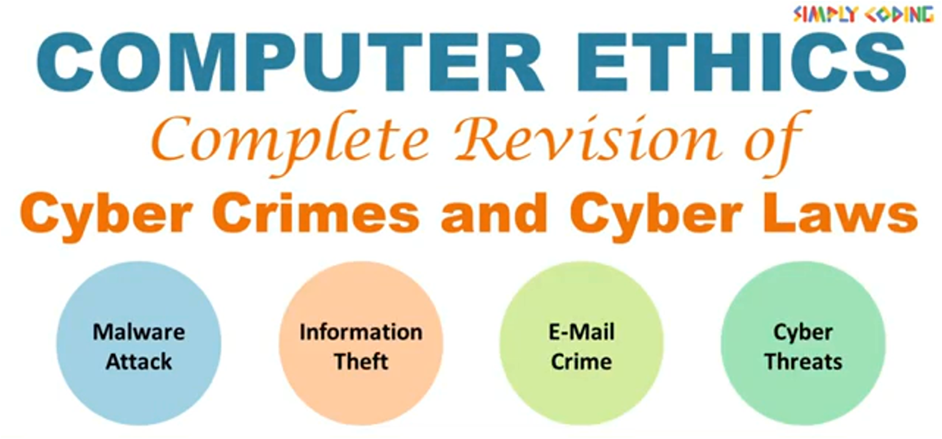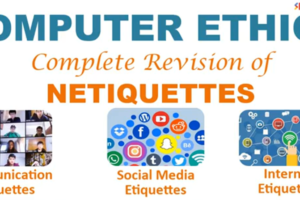
Cyber Crimes and Cyber Laws
- Categories Cyber Safety, Cyber Ethics, Cyber Laws, Cyber Ethics
Cybercrime is criminal activity that involves a computer and a network. It is committed by cybercriminals or hackers who want to make money or damage someone’s reputation.
At a broad level, cyber crimes can be divided into 4 overlapping categories –
- Malware Attack
- Information theft
- Cyber threats
- Email crime.
Lets understand each of them.
Malware Attack
Within malware attack we first have
- Virus: These are Programs designed to damage your computer by corrupting system files or wasting resources
- Worms: are programs that can replicates itself in order to spread to other computers
- Trojan Horse: They seems harmless but it can shut down or misusing websites or computer networks
- Ransom ware: Extort money by holding the victim’s data or device to ransom. E.g. WannaCry
- Denial of Services. It prevents a business from providing a software service to its customers
Information Theft
- Phishing: Here hackers use fake email messages to get personal information from internet users
- Identity theft: Here hackers misuse personal information for financial gains.
E Mail Crimes
These are crimes which use E-Mails to attack the victim
- Email Spam: Here attacker causes an overload of emails causing distress or server crash
- Email Spoofing: Here a person creates email messages with a forged sender address maybe leading to identity theft.
Cyber Threats
- Cyber Terrorism: It uses Internet to conduct violent acts.
- Cyber Pornography: It is using internet to distribute obscene materials.
- Cyber Stalking: Is where attacker makes the victim miserable or exert control by online harassment.
- Cyber Squatting: Is profiting from the goodwill of someone else’s trademark, like buying someone else’s domain names to resell then at higher price.

Now there are various laws called as Cyber Laws which refers to all legal and regulatory aspects of Internet crimes. In India it is enforced through Information Technology (IT) Act 2000. It was amended through IT Amendment Act 2008
We will now solve a case study on cyber crimes.
Cyber law is a new branch of law and is growing very fast. It establishes norms of accepted human behavior in cyberspace. Laws governing ecommerce, online contracts, copyright, trademark, business software patenting, e-Taxation, e-Governance and cyber crimes all fall within the meaning and scope of cyber law. The media gives a lot of attention to dramatic virus attacks, hackers, and other interesting Internet phenomena. In spite of daily horror stories, however, many people lack an adequate understanding about the reality of these threats.
Identity theft is a growing problem and a very troubling one. The concept is rather simple, though the process can be complex, and the consequences for the victim can be quite severe. The idea is simply for one person to take on the identity of another. Cyber-safety addresses the ability to act in a safe and responsible manner on the Internet and other connected environments. These behaviors protect personal information and Information and Computer Technology reputation.
Questions on Cyber Crimes and Cyber Laws
1. What is Privacy?
a) It is the protection of personal information given online.
b) It Is the protection given offline
c) Is taking care of your family
d) None of above
Ans. a. It is the protection of personal information given online.
2. Phishing is
a) acquiring sensitive information from individuals
b) harassment over the internet
c) control over internet
d) None of above
Ans. a. acquiring sensitive information from individuals
3. What is Cyber Stalking?
a) It is harassment carried out over the internet
b) It might target individuals, groups, or even organizations
c) It is done to control or intimidate the victim or to gather information for use in other crime
d) All of above.
Ans. All of above.
4. Ram got a call from a person who identified himself as manager from his bank. He asked for a pin which has been sent to validate his account. Ram shares the pin and few minutes later a huge sum of money is deducted from his account. Which type of cybercrime is this?
a) Cyber Terrorism
b) Identity Theft
c) DDoS attack
d) Infomania
Ans. Identity Theft
5. Cyber crime in India is addressed by which law?
a) India’s Technology (IT) Act, 2000
b) India’s Digital Information Technology (DIT) Act, 2000
c) India’s Information Technology (IT) Act, 2000
d) The Technology Act, 2008
Ans. c. India’s Information Technology (IT) Act, 2000
6. Ronit works in a bank. He needs to send confidential customer information to other branch over the internet. What is the right approach he should use?
a) He should send it using his personal mail ID as it is secure.
b) He should send it using his bosses mail ID to be sure.
c) He should encrypt the data for secure transmission.
d) He should copy the information on disk and send it only by courier.
Ans. c. He should encrypt the data for secure transmission.
7. Computer forensics involves all of the following stated activities except:
a) Manipulation of computer data.
b) Extraction of computer data.
c) Preservation of computer data.
d) Interpretation of computer data.
Ans. a. Manipulation of computer data
You may also like



